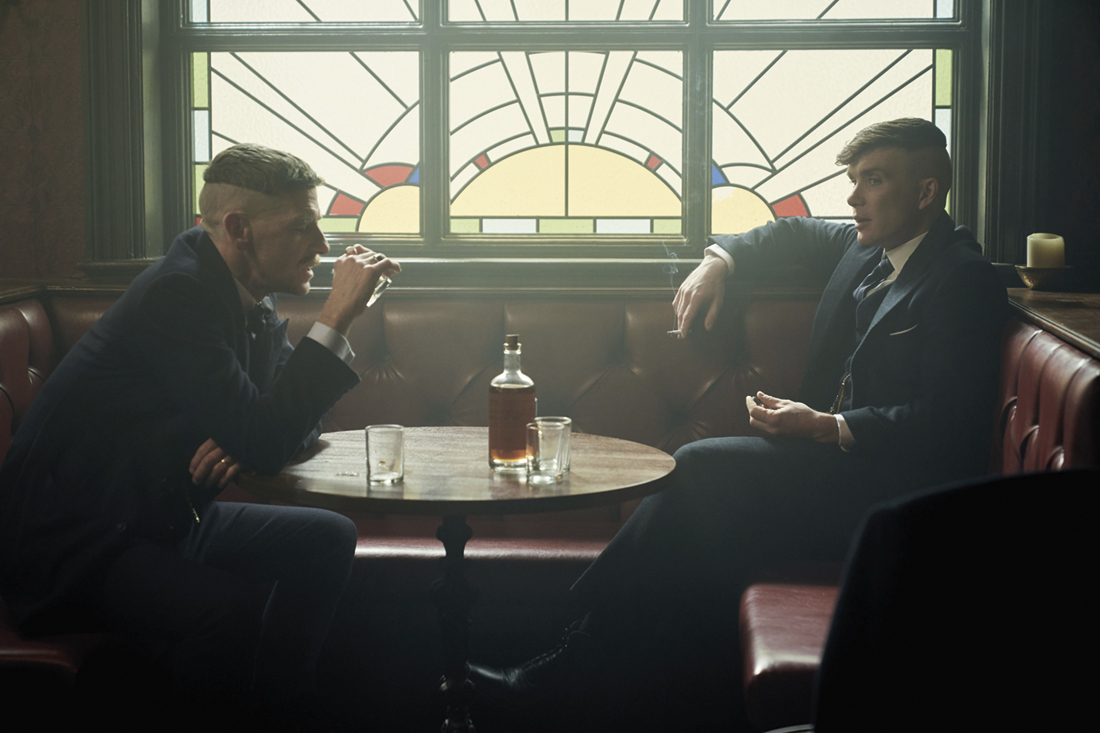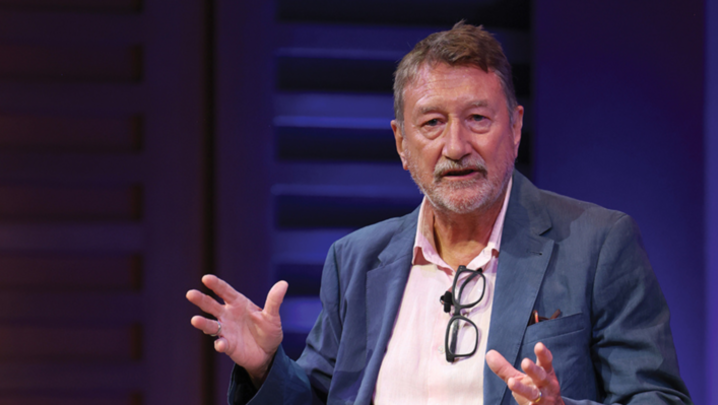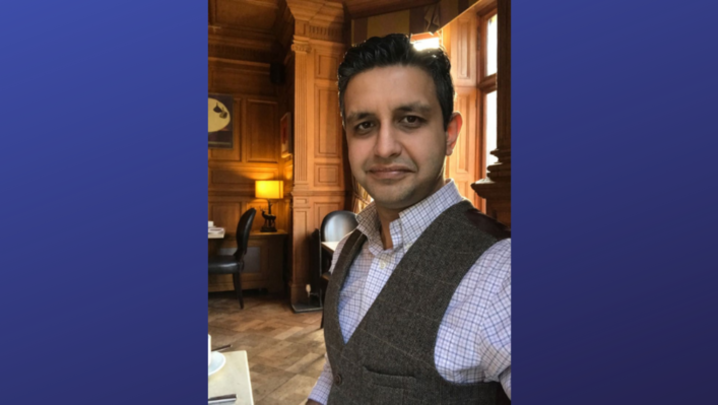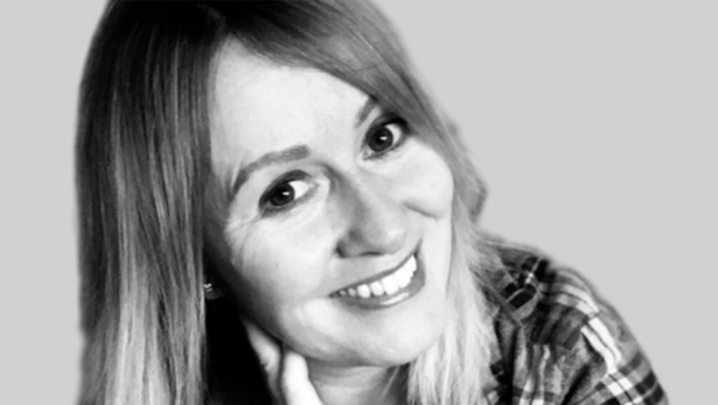Andrew Billen meets the creator of Peaky Blinders, Steven Knight, whose life story is stranger than fiction
The screenwriter about to become a studio mogul; the boardgame inventor whose next drama will launch Apple’s foray into television; the Who Wants To Be a Millionaire? creator nominated for an Oscar – there are many ways to paraphrase the extraordinary career of Steven Knight. Let’s start, however, with the blacksmith’s son who launched a million haircuts.
We meet shortly before Knight’s Peaky Blinders begins its fifth season on BBC One. It advertises the writer’s knack of finding the drama in stories – gangsters from Birmingham! – that no one else even saw as stories.
Over 30 episodes it has grown into an epic. BBC viewers, initially confused, were given time to adjust to its heightened style, and Netflix viewers all over the world have followed them. It is an example of how co-productions work best: the BBC, says Knight, leaves him alone and the US cable channel FX digs into its deep pockets.
Peaky also unlocks the door that leads to the slightly mysterious Steven Knight. He was born 60 years ago in a little village in Wiltshire, to which his blacksmith father, George Knight, had moved when his time shoeing Co-op delivery horses ended. Three months after Steven was born, the country blacksmith’s business also foundered, and the Knight family – of which Steven was the seventh child – moved back to its roots in Small Heath, south-east Birmingham.
For a while, George, the son of a canal boatman, worked with his brothers in the local car factories. But then, with a mobile forge, he started to shoe horses again in riding stables around the city – and in scrap merchants’ yards.
“I used to go in there as a kid and you would see the Peaky Blinders world,” says Knight, who is sitting opposite me in the Soho Hotel in London. We are a few feet from where he first met the actor Tom Hardy, star of his film Locke and his later BBC series Taboo.
“It was full of the last remnants of what Birmingham used to be: stolen stuff, scrap, all kinds of things. It was like an Aladdin’s cave. As my dad shoed the horses, I’d hear them talking. There was Charlie Strong, who I’ve used in the series, and Curly, who was my great, great uncle. Very, very funny people. It was that flavour of the last of the old Birmingham that I tried to put into Peaky.”

Set in the 1920s, Peaky Blinders is named after a real gang run by the Sheldon family (on legal advice, they became Shelby in the series). In his childhood, Steven’s father knew these gangsters as his uncles. One day, delivering a message, he knocked on a door and found eight men seated around a table piled with their earnings as illegal bookies.
“He said they were immaculately dressed. Razor blades, guns, drinking beer and whisky out of jam jars.”
Traditionally, says Knight, British TV dramas make working-class people objects of pity. Blinders, instead, romanticises the local legend of these men, much as Westerns mythologised American ranchers. The sharp suits that Knight’s anti-heroes wear are historically accurate, however. “From a certain background, wealth is not a number in a bank account but what you’re wearing that people can see,” he maintains.
The Blinders cropped their hair close at the back and sides, the way it had been cut in the trenches of France in order to combat lice (beneath their caps, the hair grew as its owners wished). At first, the Blinders male cast members complained but, before they knew it, every man under a certain age and with a certain vanity about him was asking for a Peaky Blinders haircut.
Now, it’s the British man’s default hairstyle. Soon, we shall see the streets jostling with Peaky Blinders suits, too: Knight is starting a high-quality clothes line, all-British cloth and all-British craftsmen. “I want it to reflect the standard of the series,” he says.
His canny sartorial entrepreneurship here, however, is nothing to what Birmingham is about to see from him. Knight plans to build massive studio complexes in Digbeth, in the centre of the city, and near the National Exhibition Centre – six sound stages in all, with three TV studios in Digbeth, initially.
He discerned a gap in the market when he was making his 2016 Brad Pitt film, Allied, and could not find studio space. “I noticed that there was a hole in the middle of the country in terms of production.” With HS2 set to cut journey times from London to 48 minutes, he found huge interest from financiers, producers and the West Midlands mayor, Andy Street.
“Everybody wants to come to the UK, partly because the best crews and the acting talent are here. This is a place where the infrastructure works. There’s a 20% tax break for overseas film-makers, which helps, too. Even though there are other territories with bigger tax breaks, Britain still attracts people. More often than not, it’s the talent, the actors, who choose the venue for making the [production].”
“Digbeth reminds me of Tribeca before it became Tribeca. There’s a lot of big Victorian warehouses, a lot of them unused, derelict factories, warehousing space, canal architecture. It’s beautiful.”
One deal has been signed, the other is about to be. I ask if a writer has ever run a studio before, and he thinks not.
What we have here, I realise, is an original thinker whose ideas cannot be limited by job description. It was his talent as a writer that was noticed first, however, when he was 10 or 11. At that stage, his ambition was simply to work in an office because no one he knew did. By the time he, the first of his family in higher education, went to university in London, he knew he wanted to be a writer.
When he left, he went back to Birmingham to work for an ad agency making radio commercials and then down to London to work as a copywriter and producer at Capital Radio. He began writing for Jasper Carrott on Canned Carrott and the police procedural spoof The Detectives. He also devised a “not very good” boardgame called PSI (for Psychology, Slander, Intuition), which became a little-remembered gameshow hosted by Chris Tarrant.
Then, in the late 1990s, with his writing partner, Mike Whitehill, and David Briggs, he invented another one, which would also be hosted by Capital’s Tarrant. This was Who Wants To Be a Millionaire?
He recalls: “No one would insure it! At first, it was an unlimited prize. Someone could keep going for ever. That’s what scared them. And when they said it’s got to have a limit, we said it’s got to be a big limit. A million was the obvious thing, I suppose.” And it supplied them with an obvious title.
At the time, he was also writing novels for Penguin. He was on his fourth, “telling it, for some reason, in the present tense”, when he realised that he was actually writing a screenplay for a movie (his third). Stephen Frears agreed to direct it, asking only for a “better ending”.
“That was it, all he said. I mean, it spoilt me for ever. I thought that was what all meetings with directors would be like.”
The thriller Dirty Pretty Things, set among asylum seekers and illegal immigrants, won Knight an Academy Award nomination for best original screenplay and a ton of prizes. Fourteen films have followed – he made his debut as a director on Hummingbird in 2013 – and their range, from war movie to romance through the one-man drama Locke, is unusually wide.
Yet his last, released this year, Serenity, was savaged by critics. How does he feel when that happens? “I don’t care. I mean, I do care. I care on behalf of other people that are involved.
“But, to be honest, what things such as Peaky have taught me is that if, for example, Serenity had been an eight-hour returning serial, by hour eight people would have got it. What’s incredible to me is that the response from people whose opinion I really respect was fantastic.
“They have to market it in a particular way. And they marketed it as a noirish thriller, which it starts out as, but that’s meant to be the trick. That’s the joke. It’s not that. Then you find out what it really is.
“I really dislike the concept of genre, where you say, ‘This is this way of looking at life’, as opposed to mixing it up. I mean, you never get up in the morning and have a comedy day or a drama day. You have everything: comedy, drama, tragedy, all of it.”
One can assume, nevertheless, that Knight has his family days, since he is married with three children – but he has never talked about his domestic life to the press. “I just don’t think it’s a good idea. I spend a lot of time around famous people and it’s so wonderful not to be famous. It’s just blissful, because they have a hard, hard life [of scrutiny].”
For someone in favour of mixing things up, it is natural that he should be contributing to the latest of what we now call the “disruptors”, Apple TV+. The service launches this autumn with Knight’s latest series, See. Starring Jason Momoa and Sylvia Hoeks, it is set 550 years into the future, and 500 years after a virus robbed mankind of the power of sight.
“The series begins when two twins are born and they can see.” The first run of eight has been filmed in Vancouver, and Knight has written the second season.
Could he have taken it to the BBC?
“The problem with the BBC is that you have to be realistic about what you can achieve with the budget. This is a big-budget thing.”
Is it aimed at the British market? “The world. What Apple is saying is: ‘We will put this programme on a billion screens at the same time, on the same day, all over the world.’”
So, it is a throwback in a way to the old idea of a big launch and episodic transmissions? “I’m hoping that this is how it’s going to transpire. There’s been a lot of talk of going back to scheduled broadcasting, because the value of it is that everybody sees it at the same time and talks about it. Then you can all watch it separately, but having that time and date.”
We won’t be able to binge-watch it all on the first night? “I hope not. I’ve heard that the plan is not to do that.”
Knight, although his hair is not cut particularly close at the temples, does not look like a 60-year-old. Nor does he talk like a grizzled, cynical veteran of this business – or businesses in his case. “I’ve been working with Ridley Scott and he’s 80. There’s no suggestion that he’s going to stop any time soon,” he says. “For me, it’s all just started. Seriously.”
Knight’s ride
Steven Knight, writer, director, producer
Married With three children
Lives Gloucestershire and Nottingham
Born 5 August 1959, in Wiltshire, but brought up in Birmingham; seventh child of George and
Ida Knight
Education University College, London (BA Hons, English)
1984-87 Writer and producer, Capital Radio
1990 Starts writing for TV: Canned Carrott, The Detectives, The Ruby Wax Show
1998 Co-creates Who Wants To Be a Millionaire?
2002 Dirty Pretty Things, for which he receives an Oscar nomination
2006 Amazing Grace
2013 Writes and directs Hummingbird
2013 Peaky Blinders launches on BBC Two
2013 Writes and directs Locke, starring Tom Hardy
2017 Taboo, also with Tom Hardy, launches on BBC One
2019 See set to air on Apple TV+
Hits Millionaire, Dirty Pretty Things, Locke, Peaky Blinders
Flop 2019 movie Serenity
Hobbies Fishing and ‘lighting fires’
Listening Dylan, Leonard Cohen
Watching ‘I hear Killing Eve is really good. I just don’t really get into a situation where I can sit down and watch things’
On Tom Hardy: ‘A lot of people are very scared of him. For good reason. But he’s great. I mean, he’s very complex but he’s brilliant’
On screenwriting in the SVoD era: ‘Parents should be saying, “Don’t be an architect. Don’t be a lawyer. Become a screenwriter. That’s where the money is.’”







